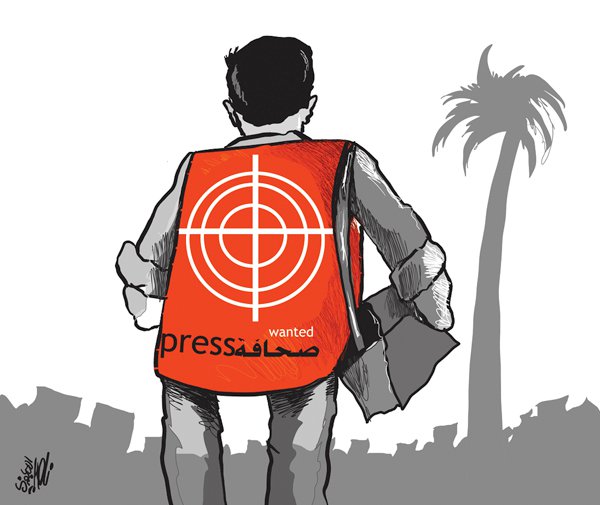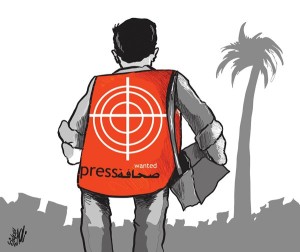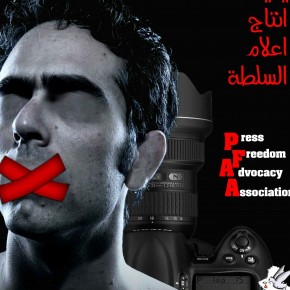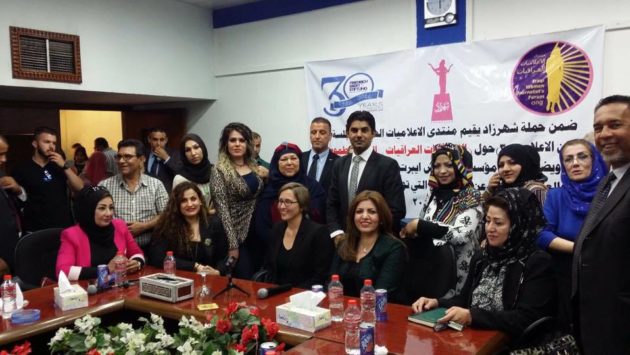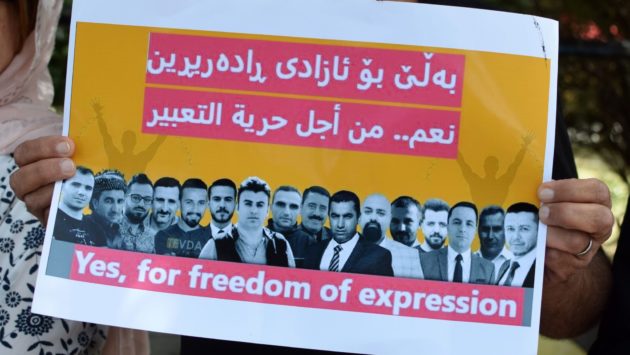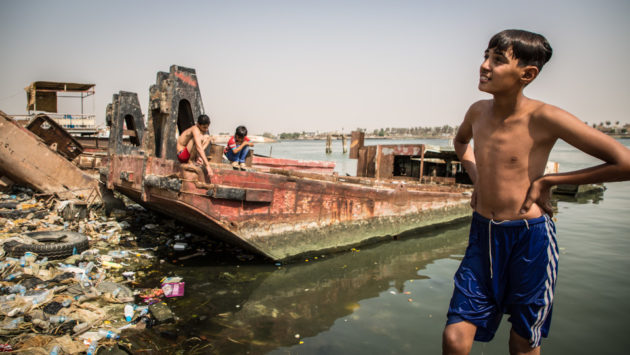Journalists in Iraq: their freedoms obliterated by laws and policies while their lives are continually threatened!
During 2013 members of the press who were killed or injured in Iraq climbed to alarming numbers, while freedom of the press was smashed between the hammer of armed militias and the anvil of the government.
The Press Freedom Advocacy Association released its annual report for 2013, highlighting the serious deterioration in the working conditions and the safety of journalists in Iraq over the last year. The Association cited 286 cases of violent acts against journalists, including kidnappings and abductions, threats, bullying, beatings, and obstruction of their coverage of events. Twenty-one reporters and journalists were killed; most of these martyrs were specifically targeted because of their work. According to the Association, this is the most serious decline in the situation of journalists since 2007 when widespread civil conflict claimed the lives of thousands of citizens, including journalists.
The Association stated that this violence is largely caused by armed militias that operate freely in many areas, regularly threatening journalists with violence and death. The government allows these perpetrators to carry out their attacks with near total impunity. The province of Nineveh was identified by the Association as the most dangerous place in Iraq for journalists to work. Indeed, most journalists there have abandoned their work as a result of the threats and killings.
Even as the government has failed to address the dramatic increase in violence that journalists are experiencing, it has reinstituted laws and practices of the Saddam era that pose tremendous challenges to freedom of the press. Journalists have been detained, arrested and tried. The Association cited more than 700 cases in which members of the press have been brought before the court of “publication and media” regarding “crimes of libel and defamation” based on an Iraqi law of 1969. In addition, new legislation adopted in 2011, the so-called “Rights of Journalists Law”, severely threatens freedom of the press, and with it the transformation to democracy in Iraq. The Association worked for the repeal of this law, and later proposed amendments to the sections of the law that threaten press freedom to the Parliament’s Committee of Culture and Media in September 2013. It also filed a lawsuit in the Federal Court to force the government to revise the law, but until now, the Parliament has not placed discussion of these crucial issues on its agenda.
Iraqi Journalists Who Were Killed in 2013
- Veteran journalist Hameed Rasheed Abbas in southwest Baghdad by gunmen on the 6th of February 2013.
- TV reporter Mufaq Al Ann by gunmen in the Mansoor district in west Baghdad on the 6th of May 2013
- Journalist Zamil Ghanim, whose corpse was found one day after he was kidnapped by gunmen in the Washash area of Baghdad on the 9th of June 2013.
- Writer and official spokesperson for the Nineveh provincial council Qahtan Sami in Mosul on the 8th of July 2013.
- Sharqiya TV network reporter Mohammed Kareem and his colleague, cameraman Mohammed Ghanim in Mosul, Nineveh province on the 8th of October 2013.
- Reporter and spokesperson of Nineveh province Saad Zaghlool in Mosul on the 8th of October 2013.
- Al Mosiliya TV network cameraman Bashar Al Naiemy in Mosul on the 24th of October 2013.
- Reporter and photographer Ala’a Adwar near his house in Mosul on the 24th of November 2013.
- Baghdad TV reporter Wadah Al Hamdani in Basra due to random firing on the 27th of November 2013.
- Writer and journalist Adil Mouhsin Hussein by gunmen in Mosul on the 2nd of December 2013.
- Reporter Yassir Al Jumaily in Syria by Al Nusra front on the 3rd of December 2013.
- Journalist Kawa Kirmiyani by gunmen in the Kalar area in Kurdistan on the 5th of December 2013.
- Mosilyia TV anchor Nibras Al Naiemy near her house in Mosul on the 15th of December 2013.
- Journalist Muhanad Mohammed due to an explosion in the Dora area of Baghdad on the 19th of December 2013.
- Five members of the staff of the Salahadin TV network Ra’ad Badri , Wesan Sabri , Ahmed Katab , Jamal Nasser, and Mohammed Abdulhameed in Tikrit after Al Qaida gunmen invaded their building on the 23rd of December 2013.
- Journalist Omar Al Faraji shot by a sniper while he was working in Ramadi, Anbar province on the 31st of December 2013.
Government Responsibility
The Association also cited many violations of journalists’ rights that reflect a mentality on the part of the authorities that does not respect the freedom of the press. Especially in Baghdad, journalists and the media are not allowed to operate unless the security forces approve their activities; granting of permission is often erratic and follows no clear, legal regulations. Among the threats and intimidation that journalists experienced were:
- 35 cases of detention or imprisonment in different places throughout Iraq.
- 188 cases of beating and attacks by members of the security forces.
- 15 cases of targeting of media outlets by security forces and gunmen.
- Closure of 13 media outlets, 10 of which had their licenses withdrawn by the “media and communications” department, in most cases without any court proceedings or legal order. The department seeks to control all media outlets by using the requirement of having a license to impose specific editorial policies on these outlets. This is a violation of the Iraq constitution and a threat to democracy.
While those targeting journalists are usually terrorists and illegal militias, it is the failure of the government to take these attacks seriously, and to identify and capture the criminals that has produced the crisis journalists now face. The impunity that those who threaten and kill journalists enjoy ensures that someone who does not like what a reporter says or publishes feels free to use violence against that reporter. In some cases, the militias have affiliations with political parties or factions.
There has been only one case in which the authorities apparently captured someone who killed a journalist. This was in Kurdistan where the government said it had arrested the criminals who killed Kawa Kirmani, but they gave no further details. The claim the authorities made that the man they arrested for killing TV anchor Nibra Al Naiemy had only been trying to steal her purse is not convincing. Most importantly, the programmatic killing of journalists in Nineveh cries out for serious official investigation.
The Legislative Challenge
While the increased targeting of journalists has been devastating, freedom of the press is Iraq is also gravely threatened by the so-called “Rights of Journalists Law”, passed by Parliament in 2011, which contains five articles carried over from laws of the Saddam era:
- Article 4: First: the reporter has the right to obtain information, news, data and statistics (unclassified) from its sources and has the right to publish it within the limits of law. The condition of obtaining and publishing unclassified information “within the limits of law” does not ensure any new right for reporters, especially since the laws that must be respected regarding classifying information or restricting publishing are the same laws legislated by the oppressive Saddam regime.
- Article 5, Second: “the journalist has the right to track what he sees appropriate to clarify his opinion regardless of the differences with other opinions and thoughts and within the limits of law”. This article also brings back repressive laws because the term “within the limits of law” means all previous and new laws.
- Article 6, First: “the journalist has the right to view reports, information and official data and the relevant authority must facilitate that unless declaring the information might harm the public order and/or breaks the law”. This prevents publishing any information regarding administration of financial corruption.
- Article 7: “it is not allowed to abuse the tools of a reporter, except within the limits of law”. This article does not provide any legal protection and it restores authority to confiscate reporters’ tools for arbitrary reasons determined by security personnel.
- Article 8: “it is not allowed to question the journalist of the opinion he declares or information he publishes and this should not be a reason for damage as long as what he does is not against the law.” This also does not provide any protection because practicing free journalism was prohibited by many laws of the previous dictatorship (including the Iraqi Penal code 111 of 1969; Publishing law number 206 of 1968; Media ministry law of 2001; Monitoring workbooks and movies law number 64 of 1973; Journalists syndicate law of 1969).
In addition, the order of the Coalition Provisional Authority, #14 of 2003, which is concerned with prohibited media activity, allows the prime minister to close any media outlet and confiscate its office or money and also imprison its staff. Other laws that have been carried over allow the government to monitor or interfere in editorial policies and to nationalize the media and newspapers. These laws clearly state that media outlets should be owned by the government. For this reason, the Association, hundreds of journalists, and many Iraqi NGOs agree that this law threatens freedom of press and creates a media controlled by the state once again.
Finally, the Parliament is considering a number of draft laws that would further limit freedom of press and free expression; they are a clear challenge to the Iraqi Constitution and to many of the international human rights agreements signed by the Iraqi government. They include:
- A draft law on free speech and peaceful demonstration, which has been read twice but not yet voted upon. The Association views the draft as an attempt to limit free speech and expression, the right to obtain information and the right to peacefully demonstrate.
- A draft law on information crimes: The law contains 31 articles that authorize penalties from high fines to life sentences for obtaining or disseminating prohibited information; many articles contradict with the Iraqi Constitution.
* * * * *
The Iraqi Civil Society Solidarity Initiative (ICSSI) works to raise awareness of the importance of combating violence against journalists. The ICSSI believes that the targeting of human rights defenders and journalists in Iraq threatens any real progress towards democracy and a stable civil state. It has joined with Iraqi civil society organizations concerned with the deterioration of the safety and working conditions for journalists to insist that the protection of Iraqi journalists is the responsibility of the Iraqi government and local authorities. All violations of journalists carried out by security forces must end. In cases where non-state actors or armed groups are committing violations, the government must be responsible for identifying, capturing and punishing all criminals. The phenomenon of impunity must end.
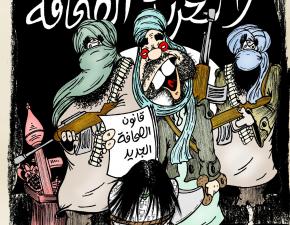
The ICSSI supports the demands of the Press Freedom Advocacy Association to amend the “Rights of Journalists Law”. Iraqi laws must be consistent with international standards on human rights in general and freedom of the press and freedom expression in particular, especially those laws that are relevant to access to information.
To read the full report of the Press Freedom Advocacy Association in 2013 Annual-Report-2013.doc.pdf

